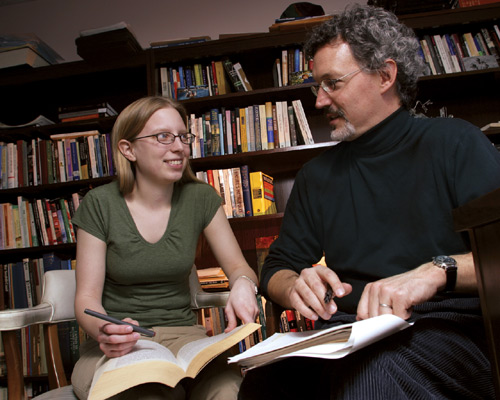Marquis Scholar Beth Ponder ’04 (Oaks, Pa.) presented research on why some infections are more resistant to antibiotic treatment at the 18th annual National Conference on Undergraduate Research, April 15-17 at Indiana University-Purdue University in Indianapolis, Ind.
“By combining my scientific training with my interest in global public health, I am attempting to bridge the gap between scientific and cultural understandings of the phenomenon of antibiotic resistance,” says Ponder, a double major in biochemistry and an individualized, interdisciplinary major in cultural biomedicine.
The presentation went beyond explaining why some treatments are becoming less successful than others, says Ponder, who recently received an honorable mention from the National Science Foundation for her Graduate Fellowship application.
“I think the conference is an excellent place to get feedback on my research ideas from a diverse group of students and educators while developing my presentation skills,” says Ponder, whose plans include pursuing a Ph.D. in microbiology or immunology while continuing to conduct research on diseases of public health importance. She is the recipient of a Goldwater Scholarship, the premier undergraduate award of its type in the fields of mathematics, science, and engineering.
The research began this past fall when Ponder conducted an intensive research project guided by William C. Bissell, assistant professor of anthropology and sociology, in which she explored the cultural, social, and economic factors that impact antibiotic use in different parts of the world.
Ponder appreciates his assistance.
“Professor Bissell spent many hours helping me develop my ideas and revise my work,” says Ponder. “I doubt this level of personal attention would be available at a larger institution.”
She also enjoys the close attention that students receive at Lafayette, and credits this attention for allowing her to pursue research that she is passionate about.
“I believe the small college atmosphere makes professors more approachable for students at Lafayette,” says Ponder. “This independent study also served as the capstone for my individualized major. Lafayette’s option to pursue an individualized major allows students such as myself with interests branching several fields to develop unique curricula to address their specific interests.”
“Beth is a scholar who shows great promise,” says Bissell, who is also Ponder’s research supervisor and academic adviser. “At a young age, she is already poised, shows great initiative, and has the capacity to think in truly original ways. I have no question that she will make a real contribution not only in her chosen field of study, but to the broader community as well.”
Last year at NCUR, Ponder presented her research on the evolution of the red ribbon, a prominent symbol of AIDS awareness in the early 1990s. Last month, Ponder presented her research on parasites with Bernard Fried, Kreider Professor Emeritus of Biology, at the 80th Annual Meeting of the Pennsylvania Academy of Science. In November, she learned from leaders in the field of schistosomiasis parasite research through a short course on “Schistosomiasis Life Cycle Maintenance” at the Biomedical Research Institute, Rockville, Md. She has published articles on her parasite research in two scientific journals.
Ponder was chosen as one of just 10 undergraduate students in the nation to participate in a prestigious National Science Foundation program last year at the Keck Graduate Institute in Claremont, Calif. Through the Research Experience for Undergraduates, she worked to develop a faster, more cost-efficient method of screening cancer drugs for toxic or beneficial effects.
During the past winter interim session, Ponder took a Lafayette study abroad course, The New Russia and The Old: Russia and Latvia, from Dec. 26-Jan. 15. She plays saxophone and flute in student musical ensembles and was a founding member of the mock trial team. She’s a member of the McKelvy House Scholars program, in which about 20 students of high academic achievement and promise reside together in an historic off-campus house and participate in shared intellectual and social activities. She is also a member of the campus chapter of American Chemical Society.
Ponder is a recipient of the Eugene P. Chase Phi Beta Kappa Prize, awarded to sophomores who have demonstrated scholarship as first-year students.
As a national leader in undergraduate research, Lafayette sends one of the largest contingents to the National Conference on Undergraduate Research each year. Forty-two students have been accepted to present their work at the next annual conference this month.

A National Leader in Undergraduate Research. Elizabeth Ponder ’04 presented her research on infections’ resistance to antibiotics with William Bissell, asst. prof. of anthropology, at the 18th National Conference on Undergraduate Research.
